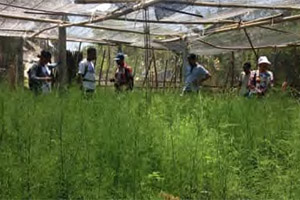Sustainability
- Home
- Locations
- What you can do
- LiFE Framework
- Sustainable Development Goals
- About us
- Grants
- Events
- Contact us
Now searching for:

Program partners inspect one of the three tree nurseries established in Manatuto Vila to supply seedlings.
A unique reforestation project coordinated by Charles Sturt University and funded by the Darwin Initiative Fund has led to huge social and environmental benefits for the rural communities in the central uplands of Timor-Leste.
The five-year project, which concluded in 2021, enabled 210 farming families (population 1,260) in Laclubar and Soibada in Manatuto district to plant trees to diversify income and food through agroforestry, tree nursery sales, and carbon credits. During the partnership, 200,000 trees were grown in nurseries and more than 120 hectares of degraded land was reforested.
Charles Sturt researchers contributed to the project in two distinct areas. Firstly, training field staff to collect forestry inventory data over four years to enable carbon modelling for the carbon accreditation process. Secondly, conducting social research to measure the livelihood impacts of the project.
Two household surveys were completed in 2017 and 2021 by Charles Sturt researchers Dr Joanne Millar and Dr Jennifer Bond to evaluate the benefits of carbon income and capacity building. Their research found that landless households also benefited from the project through growing seedlings and developing women’s microbusinesses.
The partnership also drew on support from Group Training Northern Territory, World Vision Timor Leste and local NGO RAEBIA.
Find out more about
Community reforestation project